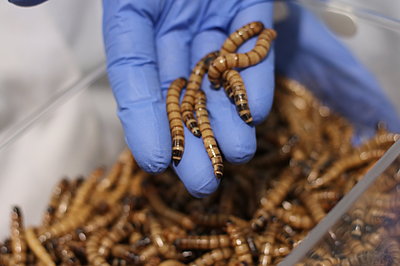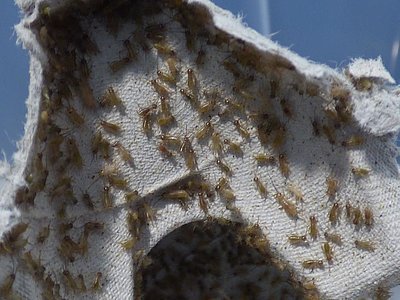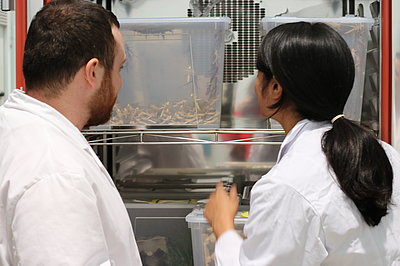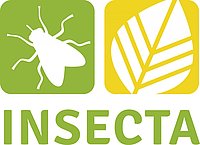Insects as alternative bioresource
More than just feedDue to the expected growth of the world population to about 9 billion people by 2050 and changes in global eating habits, the supply of protein for humans and animals will be extremely critical and requires the exploitation of alternative protein sources.
Since about 2010, edible insects have been recognized for the first time as a valuable source of protein for food and feed production, and since then, insects and products derived thereof have entered the European market. Eating insects may have some advantages as they contain more protein in percentage of their total body mass than pigs, cattle or chickens and a greater percentage of their body mass is edible (about 80 %, compared to only about 40 % for cattle). Insects are able to convert protein ingested from feed very efficiently into endogenous protein, reproduce very quickly and their rearing is considerably less demanding compared to that of conventional livestock.
Closing the gap in the circular bio-economic production of food and feed
The biological advantages of edible insects and their ability to efficiently convert low-value by-products of food production into high-quality proteins, amino acids and vitamins can contribute to more efficient protein production and in turn enhance sustainability of our food system. Thus, edible insects may contribute to closing the gap in the food system of a circular and sustainable economy. In this context, we are focusing on the sustainable production of insects to be processed into high-quality food and feed following rearing on food by-products. The development of innovative production concepts and modular rearing systems will allow urban bio-spaces to be exploited for insect production in the future.
Our research aims at including high-end technology (robotics and automated data-collection) to farm insects and applies precision-farming tools by using proprietary in-line sensor technology to obtain real-time data on our insects from hatch-to-batch. Continuous monitoring and systematic optimisation of quality and safety aspects are contributing to the production of safe and high-quality insects as a basis for food and feed.
Eco-innovative technological concepts for the sustainable exploitation of insect fractions
The production of protein rich flour from insects for incorporation into foods provides an opportunity, for insect protein to achieve widespread exploitation directly in human diets in the medium to long term. On the one hand, we apply wet extraction techniques inspired by conventional plant protein extraction routes to separate and purify the major insect components - chitin, fat, and protein including common unit operations as cell disruption, defatting, aqueous protein solubilisation, mechanical separation of insoluble fractions, protein precipitation and drying. Apart from that our research aims at employing individual and combined effects of selected novel pretreatment technologies (pulsed electric fields, ultrasound, isostatic high pressure, microwave, cold plasma) and innovative process combinations (plasma drying) for improving recoveries of key macromolecule from insect matrices and apply a range of hi-tech analytical methods to characterise the recovered fractions and to assess the effects and effectiveness of the innovative pretreament methods.
INSECTA International Conference
Since 2016 the Pilot Pflanzenöltechnologie Magdeburg e.V. (PPM) and the Leibniz Institute of Agricultural Engineering and Bioeconomy (ATB) are inviting scientists, researchers, entrepreneurs and politicians to participate in the international conference INSECTA. In 2015 the PPM had initiated the first national conference on the use of insects as food and feed and turned it into an international conference in cooperation with the ATB. Since then, INSECTA aims to provide an annual overview of the state of the art in the use of insects as food and feed as well as in the non-food sector, thereby addressing topics covering the entire value chain from research, breeding and processing to safety and waste management. With more than 270 participants from 38 countries, INSECTA2019 set a new record and was awarded the PKP*2019.
Selected research projects
-
High-quality animal proteins are difficult to replace largely by plant proteins in the feeding of carnivorous fish and omnivorous monogastric animals. The use of insect protein derived from by-products and residual strea…
-
AquaTech4Feed aims to formulate novel fish feeds from alternative protein-containing biomass sources such as algae, duckweed, insects and microbiomes (bioflakes) in order to improve fish production and product quality. P…
-
food4future consists of four inter- and intra-active research fields (FF): FF I: Organisms, FF II: Urban Bio-Spheres, FF III: Smart Nutrition & Sensor Technology and FF IV: Social Science Analysis. F4F works in individua…
-
The overall aim of the inTECH project is to develop eco-innovative technological solutions for sustainable exploitation of insects into key macromolecules. The inTECH is built on the applicant’s existing technical and re…
Search for other projects on the topic ...
Selected publications
- Psarianos, M.; Ojha, S.; Schlüter, O. (2023): Evaluating an emerging technology-based biorefinery for edible house crickets. Frontiers in Nutrition. : p. 1185612. Online: https://doi.org/10.3389/fnut.2023.1185612
- Ojha, S.; Bußler, S.; Schlüter, O. (2020): Food waste valorisation and circular economy concepts in insect production and processing. Waste Management. (December 2020): p. 600-609. Online: https://doi.org/10.1016/j.wasman.2020.09.010
- Ojha, S.; Bekhit, A.; Grune, T.; Schlüter, O. (2021): Bioavailability of nutrients from edible insects. Current Opinion in Food Science. (October): p. 240-248. Online: https://doi.org/10.1016/j.cofs.2021.08.003
- Ojha, S.; Bußler, S.; Psarianos, M.; Rossi, G.; Schlüter, O. (2021): Edible insect processing pathways and implementation of emerging technologies. Journal of Insects as Food and Feed. (5): p. 877-900. Online: https://doi.org/10.3920/JIFF2020.0121
- Shumo, M.; Khamis, F.; Ombura, F.; Tanga, C.; Fiaboe, K.; Subramanian, S.; Ekesi, S.; Schlüter, O.; van Huis, A.; Borgemeister, C. (2021): A Molecular Survey of Bacterial Species in the Guts of Black Soldier Fly Larvae (Hermetia illucens) Reared on Two Urban Organic Waste Streams in Kenya. Frontiers in Microbiology. : p. 687103. Online: https://doi.org/10.3389/fmicb.2021.687103
- Rossi, G.; Durek, J.; Ojha, S.; Schlüter, O. (2021): Fluorescence-based characterisation of selected edible insect species: Excitation emission matrix (EEM) and parallel factor (PARAFAC) analysis. Current Research in Food Science (CRFS). : p. 862-872. Online: https://doi.org/10.1016/j.crfs.2021.11.004
- Schlüter, O.; Rumpold, B. (2019): Insects as food in Europe. Journal of Insects as Food and Feed. (1): p. 1-1. Online: https://doi.org/10.3920/JIFF2019.x001
More publications on the topic ...






